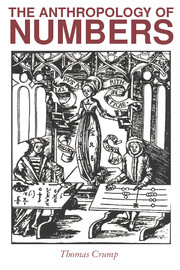Book contents
- Frontmatter
- Contents
- List of illustrations
- Preface
- Acknowledgements
- 1 The ontology of number
- 2 The cognitive foundations of numeracy
- 3 Number and language
- 4 Cosmology and ethnoscience
- 5 Economy, society and politics
- 6 Measurement, comparison and equivalence
- 7 Time
- 8 Money
- 9 Music, poetry and dance
- 10 Games and chance
- 11 Art and architecture
- 12 The ecology of number
- Notes
- References
- Index
- Cambridge Studies in Social and Cultural Anthropology
- Frontmatter
- Contents
- List of illustrations
- Preface
- Acknowledgements
- 1 The ontology of number
- 2 The cognitive foundations of numeracy
- 3 Number and language
- 4 Cosmology and ethnoscience
- 5 Economy, society and politics
- 6 Measurement, comparison and equivalence
- 7 Time
- 8 Money
- 9 Music, poetry and dance
- 10 Games and chance
- 11 Art and architecture
- 12 The ecology of number
- Notes
- References
- Index
- Cambridge Studies in Social and Cultural Anthropology
Summary
In anthropology, a faculty library will contain any number of books applying the methods and insights of the discipline to almost any category of human thought or behaviour. At the same time, the standard monograph, investigating in detail the daily life of the population upon which it is based, may range equally widely in the choice of the topics dealt with. To all this there is, however, one exception: the use and understanding of numbers. This subject, if not completely disregarded, is treated as no more than marginal, even in cases where numerical factors dominate the day-to-day life of the people being studied. To take the case of Japan, where I have been engaged in field-work throughout the 1980's, I am myself the author of almost every journal article about popular numeracy to have appeared in the west. In the hundreds of books and articles about Japanese culture and society which I have come across, this subject is seldom given any serious attention. It would be one thing if the Japanese found numbers uninteresting, but in fact they are obsessed with numbers. Almost since my first day in Japan, some ten years ago, people I hardly know have talked to me about the way numbers rule their lives, and in this the Japanese are by no means an exceptional case.
- Type
- Chapter
- Information
- The Anthropology of Numbers , pp. vii - ixPublisher: Cambridge University PressPrint publication year: 1990



